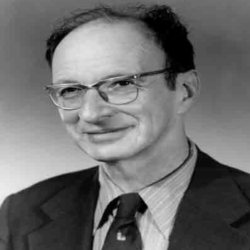
Urie Bronfenbrenner
| Date of Birth | : | 29 Apr, 1917 |
| Date of Death | : | 25 Sep, 2005 |
| Place of Birth | : | Moscow, Russia |
| Profession | : | Psychologist, Writer, Educationalist |
| Nationality | : | American, Russian |
Urie Bronfenbrenner was a Russian-born American psychologist best known for using a contextual framework to better understand human development.
Biography
Bronfenbrenner’s family moved from Moscow to the United States when he was six. He later studied music and psychology at Cornell University, where he received a bachelor’s degree in 1938. Two years later, at Harvard University, he earned a master’s degree in education, and in 1942 he graduated with a Ph.D. in developmental psychology from the University of Michigan. He served as a military psychologist during World War II and later was an assistant professor at the University of Michigan. In 1948 he moved to Cornell, where he was a professor of human development and a founder of the federal Head Start program, formed in 1965 to provide educational, health, and other support services to impoverished children.
When Bronfenbrenner was a child, his father, who was a neuropathologist, often pointed out the interdependence between living organisms and their surroundings. Those concrete examples were expanded into theories about the ecology of human development, and they were further developed during cross-cultural field research, which Bronfenbrenner conducted in places such as Europe, the U.S.S.R., Israel, and China. His work led him to define human development as a lasting change in the way a person perceives and deals with his or her environment. A child is viewed as a growing dynamic entity that progressively moves into and restructures an environment. The environment in turn exerts an influence on the individual, requiring a process of reciprocity between person and environment. Moreover, Bronfenbrenner realized that the developmental process varies by place and time and that public policy affects the development of humans by influencing the conditions of their lives.
With American developmental psychologist Stephen J. Ceci, Bronfenbrenner extended his theory to behaviour genetics. They recommended that explicit measures of the environment in systems terms be incorporated, and they proposed the existence of empirically assessable mechanisms—proximal processes through which genetic potentials for effective psychological functioning are actualized. They hypothesized that when proximal processes are weak, genetically based potentials for effective psychological functioning remain relatively unrealized and, as proximal processes increase in magnitude, potentials become actualized to a progressively greater extent.
Bronfenbrenner received national and international honours and awards for his work, including multiple honorary degrees and invitations to contribute to two U.S. Presidential Task Forces. He also was honoured by the American Psychological Association with its creation of the Urie Bronfenbrenner Award for Lifetime Contribution to Developmental Psychology in the Service of Science and Society.
Death
Awards
- The Ecology of Human Development won the 1980 Anisfield-Wolf Book Award for Nonfiction
- The James McKeen Catell Award from the American Psychological Society
- The American Psychological Association renamed its "Lifetime Contribution to Developmental Psychology in the Service of Science and Society" as "The Bronfenbrenner Award."
- Chair, 1970 White House Conference on Children
Quotes
In order to develop normally, a child requires progressively more complex joint activity with one or more adults who have an irrational emotional relationship with the child. Somebody's got to be crazy about that kid. That's number one. First, last and always.
Every child needs at least one adult who is irrationally crazy about him or her.
No society can long sustain itself unless its members have learned the sensitivities, motivations and skills involved in assisting and caring for other human beings.
Turning on the television set can turn off the process that transforms children into people... It is primarily through observing, playing, and working with others older and younger than himself that a child discovers both what he can do and who he can become — that he develops both his ability and his identity.
If the children and youth of a nation are afforded opportunity to develop their capacities to the fullest, if they are given the knowledge to understand the world and the wisdom to change it, then the prospects for the future are bright. In contrast, a society which neglects its children, however well it may function in other respects, risks eventual disorganization and demise.
Development, it turns out, occurs through this process of progressively more complex exchange between a child and somebody else- especially somebody who’s crazy about that child
Particular attention should be given to the opportunities which the environment presents or precludes for involvement of children with persons both older and younger than themselves.
There is no more critical indicator of the future of a society than the character, competence, and integrity of its youth.
We as a nation need to be reeducated about the necessary and sufficient conditions for making human beings human. We need to be reeducated not as parents--but as workers, neighbors, and friends; and as members of the organizations, committees, boards--and, especially, the informal networks that control our social institutions and thereby determine the conditions of life for our families and their children.
The primary danger of the television screen lies not so much in the behavior it produces as the behavior it prevents-the talks, the games, the family activities and the arguments through which much of the child's learning takes place and his character is formed.
